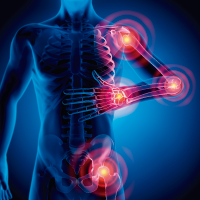Arthritis
What Is Arthritis?
Arthritis is joint inflammation, representing over 100 various diseases, typically affecting areas in and around joints. A portion of these diseases can affect other body parts, such as internal organs, muscle tissue, and skin. Some of these conditions may cause life-threatening complications or debilitated movement, left untreated for arthritis, may suffer irreversible damage in the arthritic affected joints.
Unfortunately, most types of arthritis are chronic diseases, requiring a lifelong management program to ease inflammation and pain. Some forms of arthritis can cause fatigue, and others can cause significant or bothersome swelling. More and more people are found to be suffering from rheumatoid arthritis, osteoarthritis, and related conditions, including gout, juvenile arthritis, psoriatic arthritis, Reiter’s syndrome, Sjo-grens syndrome, Lupus, infectious arthritis, fibromyalgia, Lyme disease, bursitis, psoriatic, and scleroderma.

The Signs of Arthritis:
Our professional staff and Board-Certified physicians at Heart & Health Medical know how to treat arthritis, and what supplements help treat arthritis. If you experience one or more of these, contact us as these symptoms of arthritis can be a warning side of something more severe.
The Top 10 signs of joint arthritis
- Joint Pain
- Joint Swelling
- Joint Stiffness
- Joint Redness
- A decrease in range of motion
- Skin Nodules
- Fever
- Persistent Fatigue
- Malaise
- Loss of appetite
Arthritis pain can be continual or intermittent; pain often occurs while you’re moving or after being in the same spot for some time. The pain may be in multiple parts of your body or occur in just one place. Arthritis causes joints to feel stiff and makes them difficult to move; simple tasks may become challenging. Is it a pain to open a bottle, write with a pen, or climb upstairs?
What Causes The Most Common Types of Arthritis?
Several factors contribute to the causes of joint arthritis, osteoarthritis, a prevalent type of arthritis caused by normal wear and tear life puts on the body. Cartilage tissue begins to wear down naturally and over time. Rheumatoid Arthritis is caused by the body’s immune system attacking body tissues, but the reason the immune system attacks the body is still unknown.
What Does Arthritis Feel Like?
Arthritis can occur anywhere in the body. Still, the most common cases involve pain from arthritis in knee joints and arthritis in hands, making it difficult to complete routine tasks throughout the day. Many people experience arthritis pain, as well as swelling, stiffness, and a damaged or strained range of motion after exercise and in the mornings. The affected joints may develop bone spurs and growths, which will increase pain and decrease the ability to move. People with rheumatoid arthritis tend to have joints that make noises, as well as those that have osteoarthritis joints. It can be challenging for people to go about their daily life when they are struggling with the pain that arthritis can cause. That’s why some people who find themselves in a lot of pain may decide to find a fast and effective pain relief treatment, such as using natural CBD products as they have been known to help relieve any pain until a long-term treatment plan is established. As long as you can find a course of pain relief that relieves you from this suffering, it shouldn’t matter what it is as long as it works.
About Rheumatoid Arthritis
The exact reason rheumatoid arthritis occurs remains a mystery, but it is known that the body’s immune system begins to attack the tissues of the body because it thinks they are foreign. Rheumatoid arthritis, also referred to as RA, affects over a million Americans, according to the Arthritis Foundation. The early signs of rheumatoid arthritis are usually minor. Pain coming and going on both sides and lasting longer than a few weeks or months. Each person’s symptoms are different, As with many diseases, RA has active periods called flare-ups and inactive periods called remission.
The first sign may be feeling fatigued often; sometimes, you may even feel sick or depressed. Other typical RA symptoms include pain and stiffness from arthritis in hands, knees, shoulders, ankles, feet, fingers, and wrists. Affected joints will begin to swell at the onset of mild inflammation. The swollen joints may feel warm to the touch. The inflammation of tendons may start to wreak havoc on the nerves as pressure builds up, causing feelings of tingling, numbness, or burning in the wrist, fingers, and hands. This is typically referred to as carpal tunnel syndrome. The ligaments and tendons subject to the joint inflammation begin to become deformed or unstable as the rheumatoid arthritis disease progresses. Bending over and standing back up straight may prove to be difficult; however, exercise and a healthy lifestyle are still recommended to keep from getting stiff.

